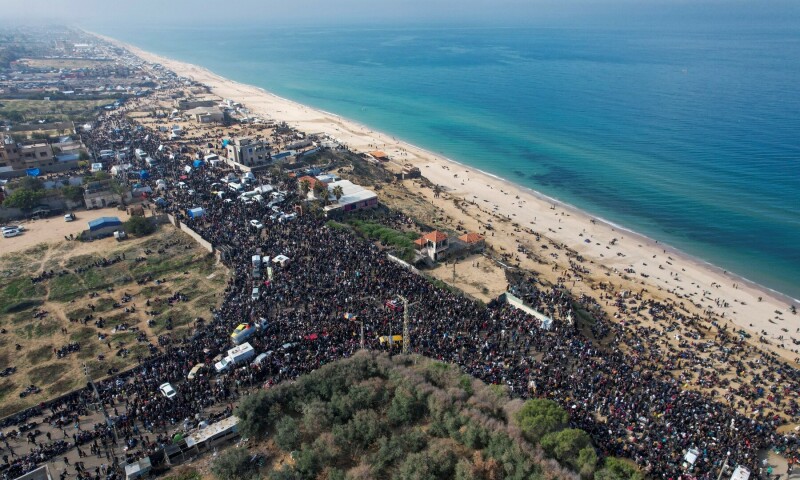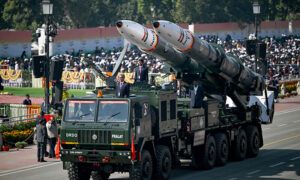US president’s suggestion to Egypt, Jordan to take in more Gaza residents heightens fears among Palestinians of being forcibly displaced in yet another Nakba.
US President Donald Trump’s suggestion that Jordan and Egypt should take more Palestinians from Gaza, shattered by 15 months of Israel’s bombardment, is seen raising concerns among the enclave’s inhabitants as well as its neighbours.
The proposal is likely to heighten fears among Gaza’s 2.3 million Palestinians of being driven out of the coastal strip, and stoke concern in Arab states which have long been worried about the destabilising impact any such exodus would have.
What is behind the concerns?
Palestinians have long been haunted by what they call the “Nakba”, or catastrophe, when 700,000 of them were dispossessed from their homes when Israel proclaimed its creation in 1948.
Many were driven out or fled to neighbouring Arab states, including to Jordan, Syria and Lebanon, where many of them or their descendants still live in refugee camps. Some went to Gaza. Israel disputes the account that they were forced out.
The latest conflict since has seen an unprecedented Israeli bombardment and land offensive in Gaza, devastating urban areas. Palestinians and UN officials say there are no longer any safe areas in Gaza to seek shelter.
Most Gazans have already been displaced several times during Israel’s onslaught, launched after Hamas’ Oct 7, 2023 attack on Israel that killed 1,200 people, according to Israeli tallies.
The military campaign has killed more than 47,000 Palestinians in Gaza since then, according to Palestinian health officials. A recent study by academics assessing the period till June 2024 suggests that the death toll could be 40 per cent higher.
What has happened during this conflict?
Before Israel launched its onslaught, it told Palestinians in north Gaza to move to what it said were safe areas in the south. As the offensive expanded, Israel told them to head further south towards Rafah.
According to UN estimates, up to 85pc of the 2.3 million people in Gaza — one of the most densely populated areas of the world — have already been displaced from their homes.
Many Palestinians in Gaza have said they would not leave even if they could because they fear it might lead to another permanent displacement in a repeat of 1948.
Egypt, meanwhile, has kept the border firmly closed except to let a few thousand foreigners, dual nationals and a handful of others leave Gaza. Egypt and other Arab nations strongly oppose any attempt to push Palestinians over the border.
Yet, the scale of this conflict eclipses other Gaza crises or flare-ups in past decades, and the humanitarian disaster deepens for Palestinians by the day.
What are Arab, Western states and the UN saying?
From the earliest days of the conflict, Arab governments, particularly Egypt and Jordan, said Palestinians must not be driven from the land where they want to make a future state, which would include the West Bank and Gaza.
Like Palestinians, they fear any mass movement across the border would further undermine prospects for a “two-state solution” — the idea of creating a state of Palestine next to Israel — and leave Arab nations dealing with the consequences.
Top UN officials have added their voices to concerns about a mass displacement. UN aid chief Martin Griffiths said last February it was an “illusion” to think people in Gaza could evacuate to a safe place.
What have Israel’s govt and its politicians said?
Israeli Foreign Minister Israel Katz said on Feb 16, 2024 that Israel had no plans to deport Palestinians from Gaza. Israel would coordinate with Egypt on Palestinian refugees and find a way to not harm Egypt’s interests, Katz added.
However, comments by some in the government have stoked Palestinian and Arab fears of a new Nakba.
Finance Minister Bezalel Smotrich called on Dec 31, 2023 for Palestinian residents of Gaza to leave the besieged enclave. National Security Minister Itamar Ben-Gvir said the war presented an “opportunity to concentrate on encouraging the migration of the residents of Gaza”.
After Jordanian Foreign Minister Ayman Safadi said on Dec 10, 2023 that Israel’s military operation was “a systematic effort to empty Gaza of its people”, Israeli government spokesperson Eylon Levy called those comments “outrageous and false accusations”.
According to a Reuters report from October 2024, which cited various sources, Israeli leaders were seeking to lock in strategic gains that go beyond military victories — to carve out de facto buffer zones and shield its borders from any future attacks.
Header image: A drone view shows Palestinians waiting to be allowed to return to their homes in northern Gaza after they were displaced to the south at Israel’s order during its war, amid a ceasefire between Israel and Hamas, in the central Gaza Strip on January 26, 2025. — Reuters/Stringer
- Desk Reporthttps://foresightmags.com/author/admin/











